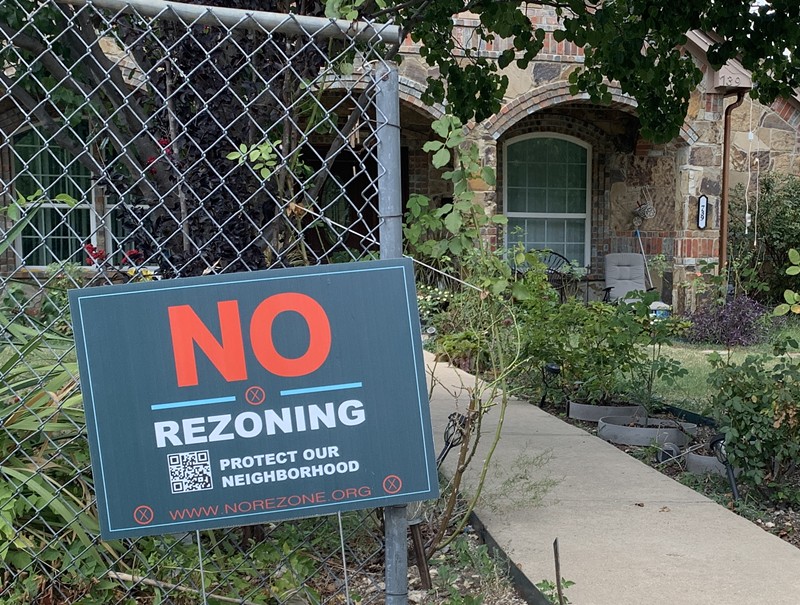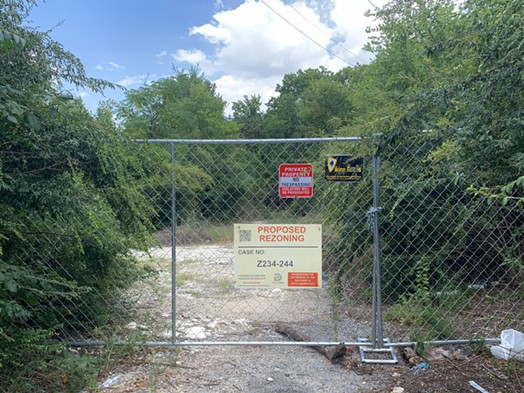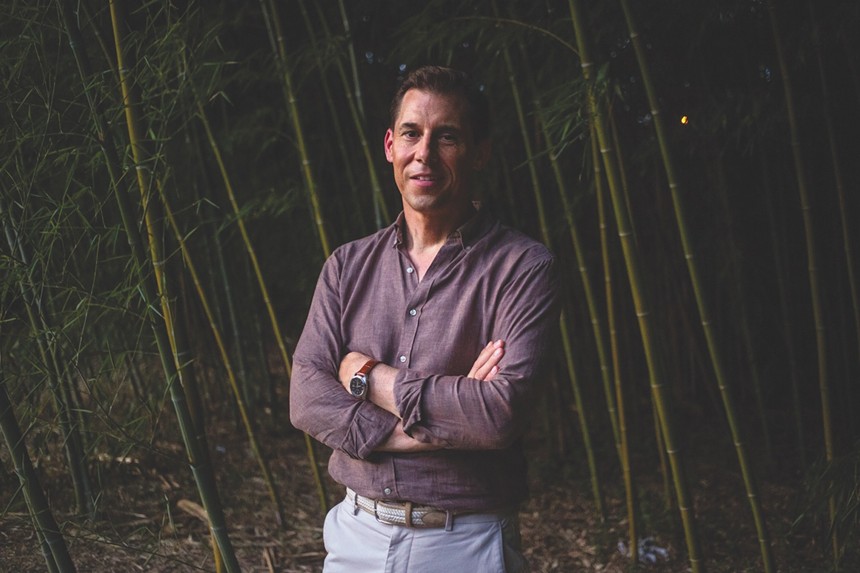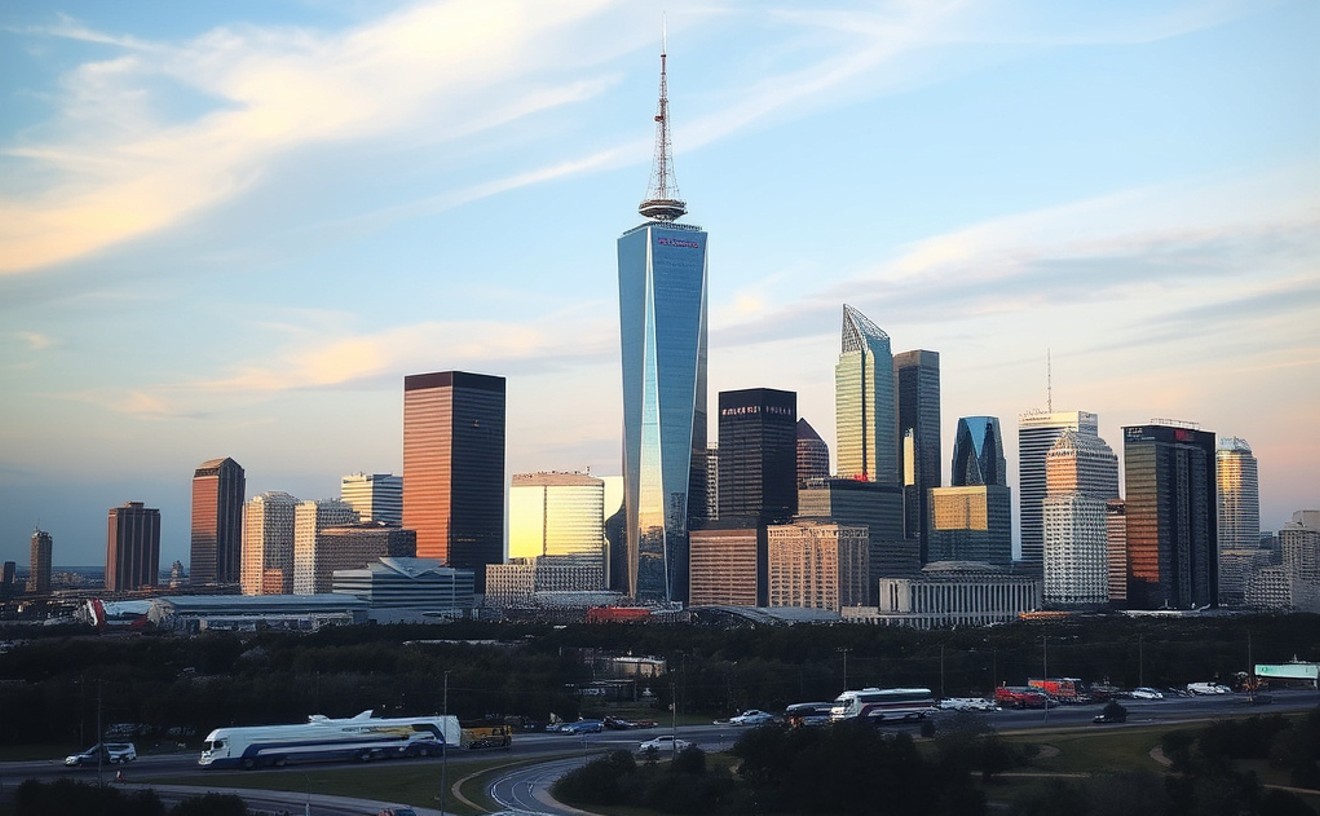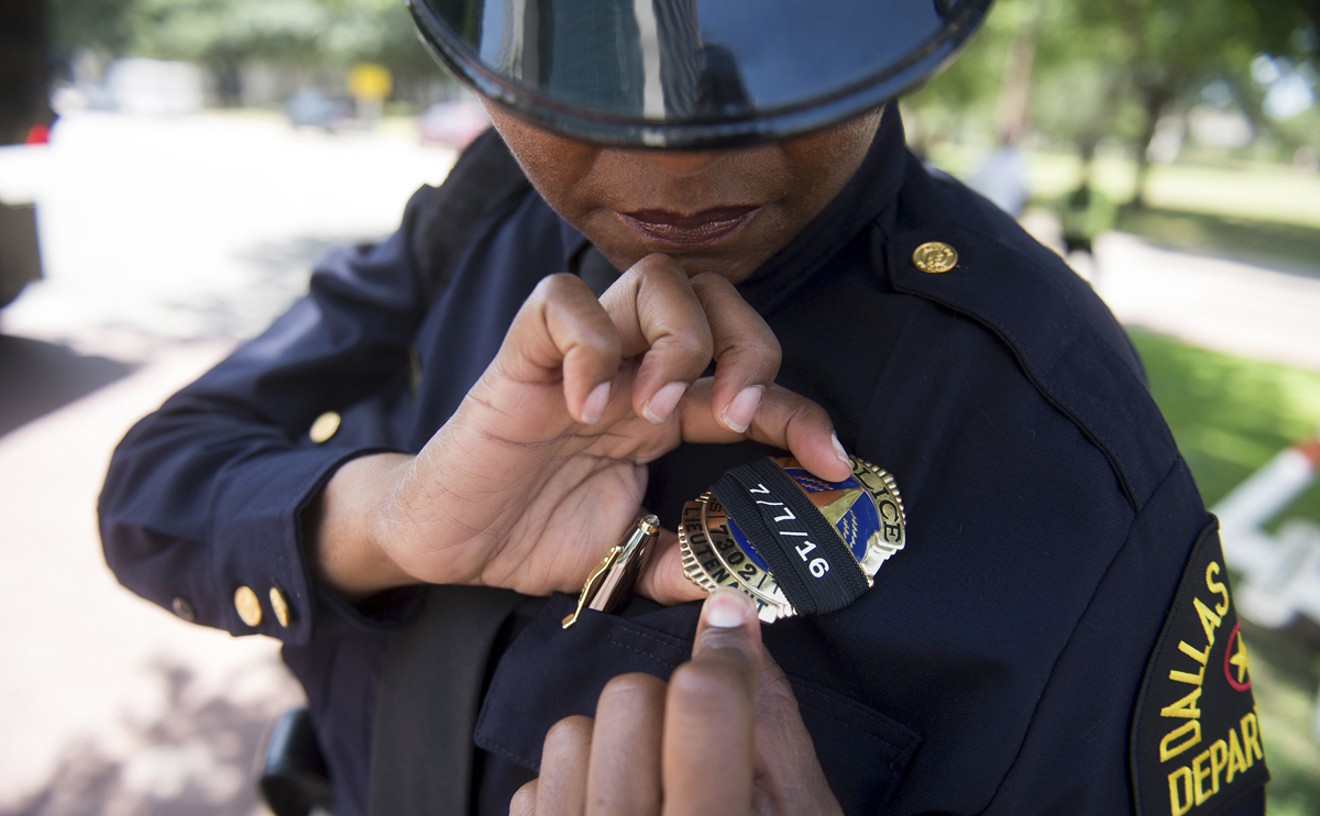North Boulevard Terrace is a dead-end street tucked between a KFC and a Burger King. It’s lined with modest homes, mostly single-family and duplexes. Swing sets and flower pots decorate front yards. It’s a primarily Hispanic, Spanish-speaking community, bordered by an elementary school to the west, a major road to the east and Coombs Creek to the north. There is no cul-de-sac at the end of the street; instead, the concrete simply turns to dirt.
The overgrown, sloping terrain between the creek and the neighborhood is owned by Christian Chernock, a long-time Oak Cliff resident and developer, who also happens to be the district’s representative on the City Plan Commission.
Chernock wants to build a diverse array of housing options on the land — has wanted to for years. But to move forward with his proposed development, he needs it to be rezoned from single-family use to multifamily.
Residents of North Boulevard Terrace and West Kessler, the more affluent neighborhood that overlooks the land the development would be built on, are against the proposal. They were against it in 2015, when Chernock first tried to get the proposal through, and they’re against it now, especially because he sits on the quasi-judicial board that could approve the rezoning request. (Chernock has recused himself from the case and is not permitted to speak to any plan commissioner, city attorney or City Council member about the development.)
West Kessler is crying corruption. Chernock is crying NIMBY. “NO REZONE” signs are being laced in front yards.
And the whole thing has the potential to get incredibly ugly.
A Zoning Case With Baggage
Joseph Beckham’s front yard is so sloped that, in the summer, his dining room looks like a treehouse built into branches. But in the winter when the leaves are gone, the dining room windows look directly onto the undeveloped land owned by Chernock.
Beckham, who is the president of the West Kessler Neighborhood Association, opposed Chernock’s plans in 2015, the first time he attempted to get the land rezoned. At that time, Chernock owned four fewer parcels of land than he does now, but his motivations were the same: Dallas had a housing problem coming, and the only way to combat it was to build denser, more diverse housing types.
He sketched out a development, Kessler Commons, that would include mid-range townhomes, apartments and homes. He planned to extend North Boulevard Terrace so it looped around itself, and the homes would overlook green space. An ingress/egress point would lead traffic onto busy nearby Hampton Road.
When he filed the initial rezoning request, it caused a stir in West Kessler. Residents opposed the traffic it would add to Hampton Road, they believed the density was “inconsistent” with the current land uses in the area and, to put it simply, they didn’t like Chernock very much.
To hear Beckham tell it, the neighborhood was open to a compromise but the whole thing fell through when the requested decrease in density would have resulted in a smaller paycheck for the developer. To hear Chernock tell it, the design was adjusted a dozen times before he realized the neighborhood would never stop moving the goalposts. Listening to both sides in 2024, it's no wonder a compromise was never achieved.
Over coffee, Chernock pulls out a large black and white map of the current proposed development and points to nearby, six-lane Hampton Road, which can carry up to 45,000 cars in a given day.
“You want to put density up against major thoroughfares and keep it out of single-family residential neighborhoods,” he says, pointing to the bus stop that would be adjacent to the property. “It’s the logical thing to do.”
Later, in Beckham’s dining room, Beckham pulls out a large black and white map of the proposed development and points to nearby, six-lane Hampton Road, which can carry up to 45,000 cars in a given day.
“You don’t want to add density to a high-mobility street,” he says, pointing to the map. “It’s totally counterintuitive.”
Chernock says the density is consistent with the area, pointing to clusters of apartment complexes just north of Coombs Creek and the townhome zoning that covers most of North Boulevard Terrace leading up to his land. Beckham says the density is inconsistent, pointing to the single-family zoning along Hampton Road and into Kessler.
It's not just that the men are on different pages about the development. They seem to be reading books written in different languages.
But back to 2015: At the City Plan Commission, the development received 13 votes in favor with one absence.
“Then it goes to [city] council, and during that time, up to council I mean, the fight was really on, because the tensions were high, the stakes were high, and you know, the gloves were off,” Beckham told the Observer. “Everything was fair game.”
In response to the contentious relationship between West Kessler and Chernock, filmmaker and neighbor Kirby Warnock created a series of videos that mocked the development and dug in a bit personally on Chernock, which Beckham says were “hilarious.” Chernock didn’t think so, though, and a lawyer sent Warnock a cease and desist letter alleging defamation. So Warnock made another video about that.
But Chernock was able to somewhat ignore the noise because he had found support elsewhere. For the months he’d been planning, he’d had the approval of then-City Council member Scott Griggs. But the rezone eventually failed for “political reasons,” he said.
“[Griggs] knew he wanted to run for mayor, and was really hoping to have the support of the neighborhoods. And so he had cheered me on and supported me, he’d said this was a great development for over a year and a half,” Chernock said. “And seven days before the hearing he said I can't support it. So that was it. It failed.” (Griggs did not respond to messages seeking comment.)
Over the next few years, Chernock focused on building other developments in the area and on being a dad. And he continued to buy land on the northern edge of North Boulevard Terrace until he had nearly 5 acres.
The rezoning case was denied without prejudice, meaning it wasn’t totally dead in the water, so Beckham knew it was only a matter of time until the development came back up for air. Then, earlier this year, City Council member Chad West named Chernock to the City Plan Commission.
“When I heard he was plan commissioner I literally texted some folks in the neighborhood — because we know he had property and we know he had been acquiring more — I said ‘We’re F'd for sure,’” Beckham said. “We knew then that there was something coming.”
Conflicting Views on What Makes a Conflict of Interest
When West first asked Chernock to take over the District 1 Plan Commission seat, Chernock was reluctant. In 2022, he’d walked West through the 5 acres of land and told him he was planning to take another swing at bringing dense housing to the area.
The plan’s latest iteration includes an apartment building of up to 100 units, although it will probably end up being fewer because of the steep topography. (“I wanted to share the highest-density scenario with adjacent residents to be transparent on what they would perceive as a worst case scenario,” Chernock said.) An additional 45 multifamily units and manor homes are drawn up for the eastern half of the property, and a road leading out to Hampton would be gated and used only by first responders in the event of an emergency. Traffic is planned to travel along an extension of North Boulevard Terrace and across a bridge over the creek.
So Chernock responded to West’s offer by saying, “Hey, remember that plan I told you about? I’m putting it in front of the CPC this year.”
But front of mind for West were the other, bigger projects coming up on the commission’s agenda: parking reform, zoning reform and the gargantuan Forward Dallas citywide development plan. For each of those tasks, Chernock was the man for the job, West said.
“He's diligent, he doesn't get caught up in the social media chatter and sort of the waves of support or opposition that come and go. He stays true to what he believes — even though I may not always agree with him — is the right path forward for the city,” West said. “I told him as long as he meets the ethical rules of the city and gets the checks and balances done with the city attorney's office, I'm completely fine with [him having his own cases on the CPC agenda.]”
Before accepting the position, Chernock consulted with city attorneys and Dallas’ Office of Ethics and Compliance, where he was told conflicts are not uncommon on the committee. He does have to recuse himself, leaving the room anytime his zoning proposals come up for discussion.
Chernock submitted the rezoning requests in May, and they have not yet been added to a CPC agenda. When the case is scheduled, it's almost guaranteed the public comment will include fiery opposition, and Chernock isn't allowed to defend himself or his project.
“Why would the city of Dallas accept my application if it were going to be unethical and hence put themselves into a compromising situation?” Chernock says. “I can't talk to a plan commissioner. I cannot talk to any staff about the case. I cannot talk to any council members about the case. That's something I would be able to do if I was a citizen, so from that standpoint, I feel disadvantaged.”
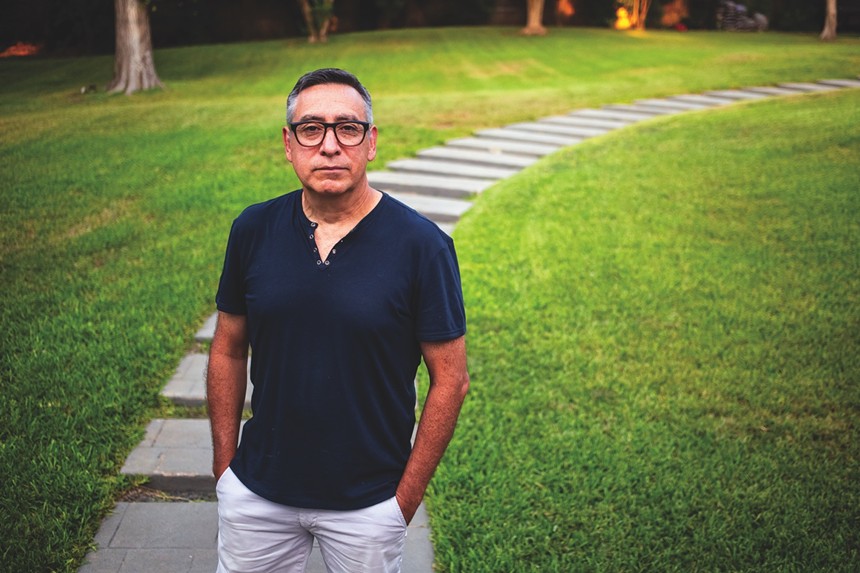
Even the appearance of a conflict of interest is something Beckham doesn’t feel comfortable with. Chernock is required by the city to recuse himself in the case, and Beckham thinks West should recuse himself too — although, he laments that it would mean District 1 does not have an elected official representing their wills. He says West should recuse himself because one look at campaign financial reports shows that “the fix is in.”
(Chernock and Beckham have both contributed to West’s council campaigns, campaign finance records show, although Beckham’s donations ceased after West’s first term on the council.)
For as long as West has been in office, neighborhood naysayers have been skeptical of his relationship with developers, although West says his history of successful projects is due to his willingness to be up front with developers about whether he supports a project.
“A lot of the developments, you see council members standing up to a developer at the horseshoe. I see that as a situation where there haven't been prior meetings that have resolved issues,” West said. “So in my mind, you're not going to see me do that because I've already handled it before it got up there.”
Beckham says he is also concerned about the “clear shot” the new development proposal offers into Chernock’s mind and approach to housing and what it could signify for all those other big projects on the CPC docket.
“If this is what the commissioner thinks we should be doing with all our land in Dallas and all our single-family homes, this is alarming for a lot of people who are not comfortable with Forward Dallas,” Beckham says. “They use this term, you hear it a lot, gentle density. This is the opposite of gentle density. This is a hostile takeover of a neighborhood.”
Chernock’s development isn’t actually in the West Kessler neighborhood — it’s across the street from it. And just earlier this year, an array of townhomes was built on the neighborhood’s southern side, less than half a mile from Chernock’s proposed development; only those townhomes are, for lack of a better phrase, bougie as hell. Chernock's plan isn't.
And that’s where the accusation that West Kessler neighbors are crying “Not In My Backyard” comes in.
“Nobody likes to change the status quo. I don't blame the neighbors, they are advocating for what they perceive as in their best interest,” Chernock said. “That's what they should do. I can't blame somebody for that. But we can't continue to make housing policy at the city level that is undermining what's going to serve the greater good.”
The Residents of North Boulevard Terrace
Yesenia Serrano grew up as one of the few kids on North Boulevard Terrace, where her mom moved in 1994. The community was mostly elderly residents when she moved in, but as the years went on, more and more families began to join. It went from being a “quiet” street to the type of place where the kids run around from house to house playing, she said.
In 2015, when the neighbors received a notice about a planned development at the end of their street, they didn’t think much of it.
“Nobody ever really went back there. I think there was like a house or two maybe down there,” Serrano said. “It was just kind of like, oh, OK, well, there's empty land. I guess they're just going to throw stuff on there because it's empty. And then I didn't really hear much about it after that.”
This time, though, the neighbors are vehemently against Chernock’s plans. The same NO REZONE signs that line Hampton Road are in front of almost every house on North Boulevard Terrace, except they’re in Spanish.
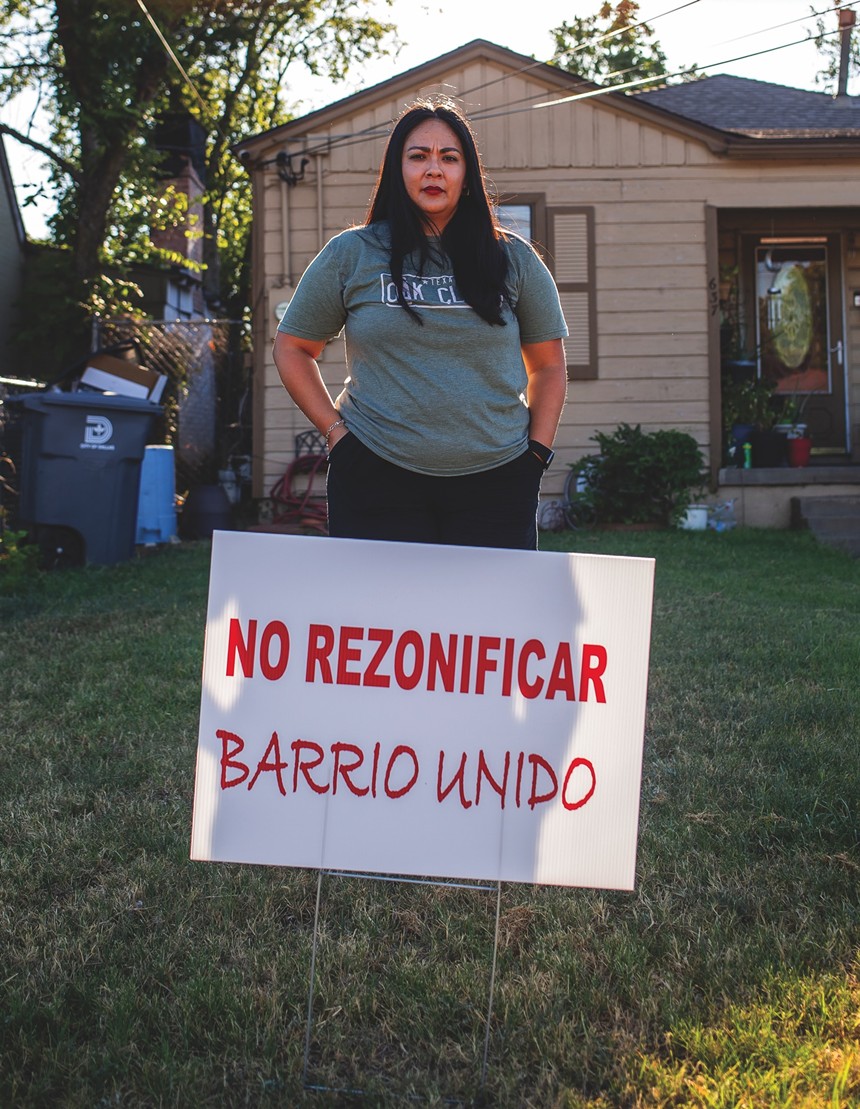
Serrano said neighbors are concerned about the effect that opening up the roadway will have on through traffic. If the street gets busy, it would take away “the safety net we have for our kids,” she said.
They’re also worried that a new development is going to spike their property taxes. In a community made up of lower-income, Spanish-speaking residents, Serrano believes an uptick in taxes would be a death blow to some homeowners.
“Do I really want my mom to have to spend her Social Security checks paying extra taxes because someone decided ‘There's empty land, like, let's throw something there?’” Serrano said. “I keep hearing ‘affordable housing’ but I mean honestly what is affordable now? It's not made for us. I honestly feel like what they're trying to do is just drive us all out.”
That fear is the refrain of Oak Cliff, with good reason. In the last 20 years, the neighborhood has been a gold rush for developers, many of whom built over historically Black and Hispanic neighborhoods. As an Oak Cliff resident for 24 years, Chernock said he understands the distrust. He’s seen what it’s like when a developer promises one thing and delivers another.
He also defends his record of building high-quality, architecturally interesting properties in the neighborhood. And, with 5 acres in one of the fastest growing pockets in Dallas, he says it simply isn’t a matter of “if” the land gets developed, but when and by whom.
“If I can't have the zoning entitlements for this project that allow me to do a great project, that's OK, I'll live. I'll sell the land, and somebody else will develop it and most likely, given [the land’s] size, it's going to be a large player. Most likely from out of the area and most likely we will get generic architecture, generic materials and generic designs,” Chernock said. “So if the neighborhood is successful in helping kill my project, it may seem like a win on the surface. But in a larger perspective, have they won?”

